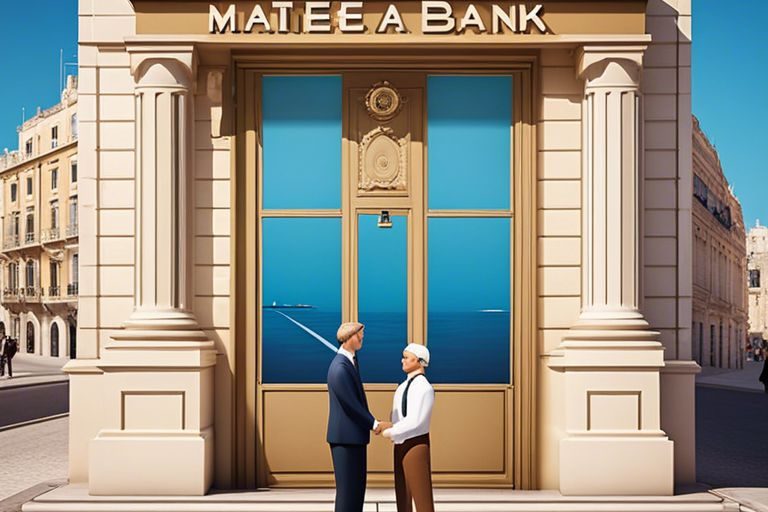Banking Basics for Newcomers to Malta

Banking in a new country can be overwhelming, but understanding the basics of banking in Malta is important for newcomers. From setting up a bank account to navigating fees and services, this guide will provide you with the necessary information to confidently manage your finances in Malta.
Whether you are looking to open a personal account or a business account, knowing the requirements and benefits of each banking option is crucial. Additionally, being aware of potential scams and security measures will help you protect your assets while enjoying the convenience of banking in Malta. Follow these banking basics to ensure a smooth transition and a secure financial future in your new home.
Getting Started with Banking in Malta
To begin on your banking journey in Malta, the first step is to understand the types of banking services available in the country. This knowledge will help you make informed decisions about which bank to choose based on your specific needs and preferences.
Types of Banking Services Available
To start off, there are several types of banking services available in Malta. These include traditional banking services such as personal savings and checking accounts, as well as more specialized services like investment accounts, foreign currency exchange, and mortgage loans. It is imperative to familiarize yourself with the range of services offered by different banks to find the ones that best suit your financial goals and lifestyle.
| Savings Accounts | Investment Accounts |
| Checking Accounts | Foreign Currency Exchange |
| Mortgage Loans |
Recognizing the diversity in banking services available will enable you to make well-informed decisions and select a bank that aligns with your financial needs.
Choosing the Right Bank for Your Needs
Types of banks in Malta cater to different customer needs, ranging from international banks with a wide range of services to local banks focused on personalized customer care. When choosing a bank, consider factors such as fees, interest rates, branch locations, and digital banking capabilities to ensure it meets your requirements.
Plus, inquire about the bank’s reputation, customer service quality, and any additional perks they offer to their clients. Making a well-thought-out decision about the bank you choose will positively impact your overall banking experience in Malta.
Opening a Bank Account
The bank account opening process is crucial for newcomers to Malta as it allows them to securely manage their finances and access various banking services. Whether you are a resident or a non-resident, having a bank account is crucial for day-to-day transactions, receiving salary payments, and more.
Documents Required for Account Creation
When opening a bank account in Malta, you will typically need to provide the following documents:
1. Proof of identity, such as a valid passport or ID card.
2. Proof of address, which can be a recent utility bill or rental agreement.
The Account Opening Process
Once you have gathered all the necessary documents, you can visit a bank branch in Malta to start the account opening process. The bank representative will guide you through the application form and explain the different types of accounts available.
After submitting your application and documents, the bank will verify your information and may conduct a brief interview to understand your banking needs. Once your account is approved, you will receive your account details and can start using your new bank account.
It is important to thoroughly review the terms and conditions of your new bank account to understand any fees, transaction limits, and other important details related to your account.
Understanding Banking Products
Savings and Checking Accounts
Products such as savings and checking accounts are vital for managing your day-to-day finances in Malta. Savings accounts can help you build a financial safety net by earning interest on your deposits, while checking accounts provide easy access to your money through debit cards and online banking. When choosing these accounts, consider factors such as fees, interest rates, and convenience of access.
Loans and Credit Facilities
With a variety of loans and credit facilities available in Malta, it’s important to understand the differences between them. Whether you need a personal loan, credit card, or mortgage, carefully review the terms and interest rates before committing. Make sure to borrow responsibly and only take on debt that you can comfortably repay.
When considering a loan or credit facility, credit scores play a crucial role in determining your eligibility and interest rates. Improve your credit score by paying bills on time, keeping credit card balances low, and avoiding new debt unless necessary.
Investment Services
Loans can also offer investment services that allow you to grow your wealth. From fixed deposits to mutual funds, there are various options to suit your risk tolerance and financial goals. Understand the risks and potential returns associated with each investment product before making any decisions.
When considering understanding investment services, seek guidance from financial advisors or make use of online resources to educate yourself. Diversify your investments to spread risk and maximize potential returns over the long term.
Navigating Online Banking
Many individuals find online banking to be a convenient and efficient way to manage their finances. With just a few clicks, you can check your account balances, transfer funds, pay bills, and more. However, it’s crucial to understand how to navigate online banking safely and securely to protect your personal information and funds.
Setting Up Online Banking
To start using online banking, you will need to set up an account with your chosen bank. This process typically involves creating a username and password to access your account online. Make sure to choose a strong, unique password that includes a combination of letters, numbers, and special characters for added security. Additionally, some banks may offer two-factor authentication for an extra layer of protection.
Security Measures for Safe Online Banking
For a safe online banking experience, it’s crucial to be aware of security measures provided by your bank. These may include encryption technology to protect your data, secure login processes, and regular monitoring for suspicious activity. Furthermore, it’s crucial to never share your login credentials with anyone and to log out of your account after each session to prevent unauthorized access.
Plus, be cautious of phishing scams where fraudsters try to trick you into revealing your personal information through fake emails or websites. Always verify the authenticity of any communication you receive from your bank and report any suspicious activity immediately.
Regulatory Framework and Protections
Now, let’s examine into the regulatory framework and protections in place for banking in Malta. Understanding these key aspects will help newcomers navigate the financial landscape with confidence and security.
The Malta Financial Services Authority (MFSA)
The Malta Financial Services Authority (MFSA) is the regulatory body responsible for overseeing the financial services sector in Malta. Established under the Malta Financial Services Authority Act, the MFSA plays a crucial role in ensuring the stability and integrity of the financial system. It supervises banks, insurance companies, investment firms, and other financial institutions to uphold high standards of conduct and compliance with regulatory requirements.
Deposit Protection and Account Insurance
As far as deposit protection and account insurance, Malta offers robust safeguards to protect depositors’ funds. The Depositor Compensation Scheme (DCS) is a safety net that provides protection for eligible deposits up to a certain limit in the event that a bank fails. This scheme aims to provide peace of mind to depositors and maintain confidence in the banking system.
With the DCS in place, depositors can rest assured that their savings are safeguarded up to a specified amount, typically €100,000 per depositor per bank. This protection applies to various types of deposits, including savings accounts, current accounts, and term deposits, offering a level of security for individuals entrusting their funds to Maltese banks.
Tips for International Transfers and Currency Exchange
For newcomers to Malta, navigating the world of international transfers and currency exchange can be overwhelming. Here are some important tips to help you make the most of your transactions:
- Use a reputable financial institution or money transfer service for your international transfers.
- Consider the exchange rates and fees charged for currency exchange and international transfers.
- Be aware of any regulations or requirements for international transactions in Malta.
- Keep track of your transactions and stay informed about the latest developments in the financial sector.
Perceiving the nuances of international transfers and currency exchange is vital to avoid costly mistakes and ensure smooth transactions.
Understanding Exchange Rates
Currency exchange rates determine the value of one currency in relation to another. When exchanging currencies, it is important to pay attention to the buying and selling rates offered by financial institutions or exchange services. Fluctuations in exchange rates can impact the amount you receive in the foreign currency, so it is advisable to monitor rates closely before making a transaction.
Best Practices for International Wire Transfers
International wire transfers allow you to send money overseas securely and quickly. When making an international wire transfer, it is vital to provide accurate recipient details to avoid any delays or complications. Additionally, be mindful of the fees involved in the transfer, as they can vary depending on the transfer amount and destination. Using a reliable and secure payment platform can help safeguard your funds and ensure a seamless transfer process.
Understanding the ins and outs of international wire transfers can help you navigate the process with confidence and ensure your money reaches its intended destination safely.
To wrap up
Taking this into account, newcomers to Malta can now confidently navigate the banking system with a clearer understanding of the basics. By knowing the types of accounts available, the necessary requirements, and the common banking terms, individuals can make more informed decisions when it comes to managing their finances in Malta. It is crucial to build a good relationship with your chosen bank, keep track of your transactions, and seek assistance when needed to ensure a smooth banking experience in your new country.
With this knowledge in hand, newcomers can better integrate into the Maltese banking system, feeling more empowered to handle their financial affairs successfully. By following these banking basics for newcomers to Malta, individuals can establish a solid foundation for managing their money and achieving their financial goals in their new home. Making use of the available resources and asking questions when unsure will contribute to a positive banking experience in Malta.
Recommended Posts

Financial Aspects of Doing Business in Malta
July 26, 2024

The Rise of Digital Banking Solutions in Malta
July 24, 2024





